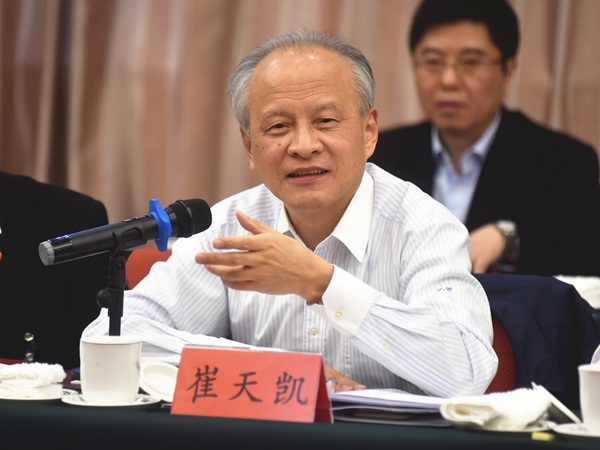Cooperation Brings Benefits while Confrontations Wound – Chinese Ambassador to the U.S. Cui Tiankai on China-U.S. Relations
China Today, April 26, 2017 Adjust font size:
China and the United States – the former the largest developing country and the latter the biggest developed country – are both permanent members of the United Nations Security Council. They hence wield considerable global influence. The appropriate handling of bilateral relations between the world’s top two largest economies, therefore, could bring benefits both to them and to the world as a whole.

Cui Tiankai is a member of the National Committee of the Chinese People’s Political Consultative Conference (CPPCC) and Chinese Ambassador to the United States. He gave China Today an interview on March 4 on the sidelines of China’s NPC and CPPCC, known as the “two sessions.” Cui reiterated the fundamental consensus reached by the leaders of the two nations that: “China-U.S. cooperation would be beneficial to both countries and to the world, while confrontation would be disastrous.”
Sound and Stable Relations–a Mutual Responsibility
Chinese President Xi Jinping and U.S. President Donald Trump have so far had two telephone conversations. In the latest one President Xi commended Trump for agreeing to expand China-U.S. cooperation, thus fostering constructive bilateral relations which are beneficial to them and to the international community as a whole. Trump, meanwhile, confirmed that the U.S. government coheres to the one-China policy. The two heads of state promised to maintain close ties, and both anticipate an official meeting before long.
“The two leaders reaching a consensus on establishing powerful bilateral relations which benefit the peoples of both nations and contribute to world peace and stability. It is a positive signal from the governments of China and the U.S. to the whole world,” Chinese Ambassador Cui said. “I am very glad to see the two leaders achieve such a consensus at this early stage of President Trump’s term in office,” he added.
“Non-conflict, non-confrontation, mutual respect, and win-win cooperation” – the principles of a new model of major-country relationship between China and the United States – constitute the fruits of three long conversations between Chinese President Xi and the then U.S. President Obama. The first was in 2013 at Sunnylands in Rancho Mirage, California, the second in 2014 at Zhongnanhai in Beijing, and the last one was in 2015 at the White House in Washington.
Ambassador Cui reflected on the historical events since former U.S. President Nixon’s first visit to China over 40 years ago. The two countries have since gone to great lengths to discuss and define China-U.S. bilateral relations. The international environment and national conditions of China and the U.S. have undergone profound changes – most notably the end of the Cold War, the global financial crisis, and the onset of terrorism, climate change, and frequent epidemics of communicable diseases. Yet China-U.S. relations have absorbed and overcome all difficulties and continued to advance.
Ambassador Cui believes that this is attributable to the great importance which several generations of the leaders of both countries have attached to bilateral ties, and to their consistent consensus on maintaining sound and stable relations. China’s pioneering leaders – Chairman Mao Zedong and Premier Zhou Enlai – through to the current Chinese President Xi Jinping, and successive U.S. presidents since the establishment of diplomatic relations between China and the U.S., Democrat and Republic, have indeed upheld sound and stable China-U.S. relations.
“This primarily accords with our respective interests, because sound and stable relations are of benefit to us both; meanwhile it is the global responsibility of these two major countries,” Ambassador Cui said. “It would be disastrous for the two countries and for the world as a whole if bilateral relations were to fail or be challenged by conflict or confrontation. This is something all concerned seek to avoid.”